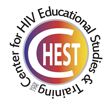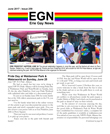BEYOND THE GAYBORHOOD: New CHEST Study Looks At HIV And Other Health Risk Differences Between Rural And Urban Gay And Bisexual Men Across The U.S.
A new paper by Dr. Jeffrey Parsons, Distinguished Professor of Psychology at Hunter College, and his colleagues at the Center for HIV Educational Studies and Training (CHEST; www.chestnyc.org), identified significant differences between rural and urban gay and bisexual men across the United States on a number of mental health and other factors. As part of their ongoing research on syndemics - a term used to describe how synchronized epidemics in marginalized communities (such as the LGBT community) can reinforce and compound the risk for disease, including HIV – Parsons and his team surveyed 1,033 HIV-negative gay and bisexual men from across the U.S. through the One Thousand Strong project. Among gay and bisexual men, the syndemic conditions that most contribute to HIV risk are intimate partner violence, depression, sexual compulsivity, and polydrug use, and all of these conditions were linked with increased HIV transmission risk behavior in the One Thousand Strong cohort.
"Most studies of syndemics have surveyed gay and bisexual men from large urban cities – and we know very little about the health issues faced by men who live in more rural areas," said Dr. Parsons, lead author of the paper and the Director of CHEST. Overall, 62% of the nationwide sample reported at least one syndemic condition. "Men in One Thousand Strong living in less urban areas were more likely to report multiple syndemic conditions, suggesting we need to be doing more to address the mental health and other needs of gay and bisexual men who don 't live in large cities." The paper, which will be published in an upcoming issue of Health Psychology, found that those gay and bisexual men not living in large cities had higher rates of most syndemic conditions, including being more likely to report symptoms of sexual compulsivity (22%, compared to 13% of urban men). Gay and bisexual men with three or more syndemic conditions reported the greatest percentage of HIV transmission risk behavior.
According to Dr. Parsons: "By focusing on a national sample, and ensuring representation of gay and bisexual men from both urban and more rural areas, we 're learning things that studies limited to large cities often miss. Gay and bisexual men who live in cities have more access to gay-affirmative services – which may be one of the reasons they report fewer syndemic conditions. Because syndemics are so strongly related to HIV risk behavior, HIV prevention efforts need to focus on the whole person – not just what they do sexually."
About the study:
The results of this study titled, "Syndemic conditions and HIV transmission risk behavior among HIV-negative gay and bisexual men in a U.S. national sample," by Jeffrey T. Parsons, Brett M. Millar. Raymond L. Moody, Tyrel J. Starks, H. Jonathon Rendina, and Christian Grov, will be published in an upcoming issue of Health Psychology.
CHEST 's mission is to conduct research to identify and promote strategies that prevent the spread of HIV and improve the lives of people living with HIV. We have been advocating for and working with the LGBT community since 1996. www.chestnyc.org





